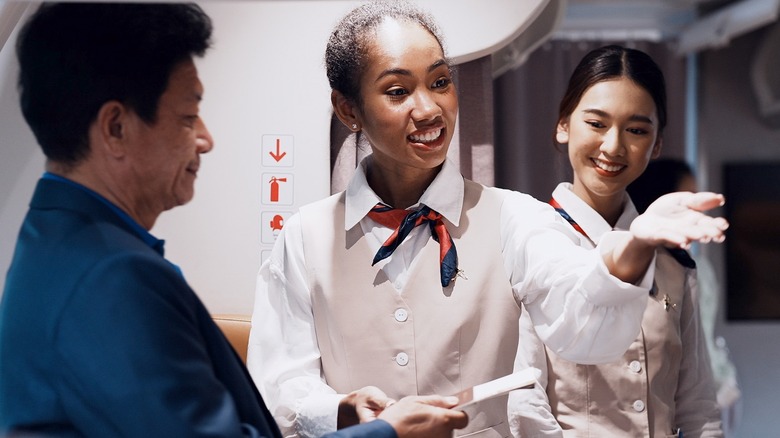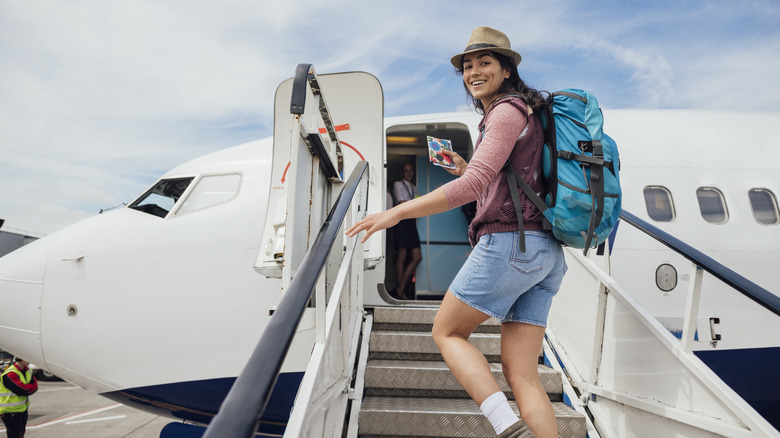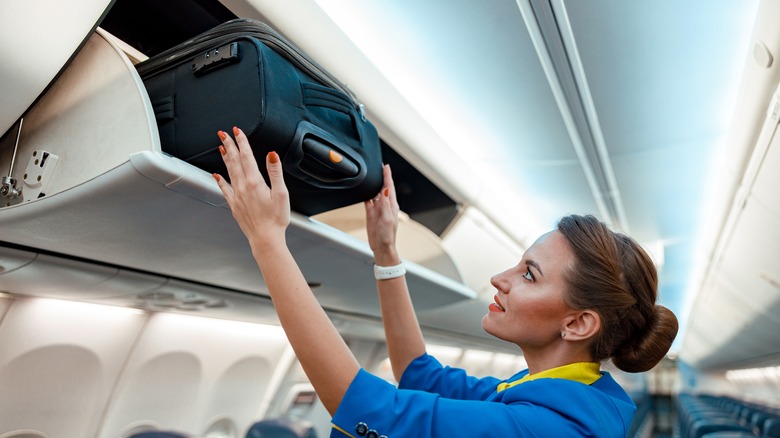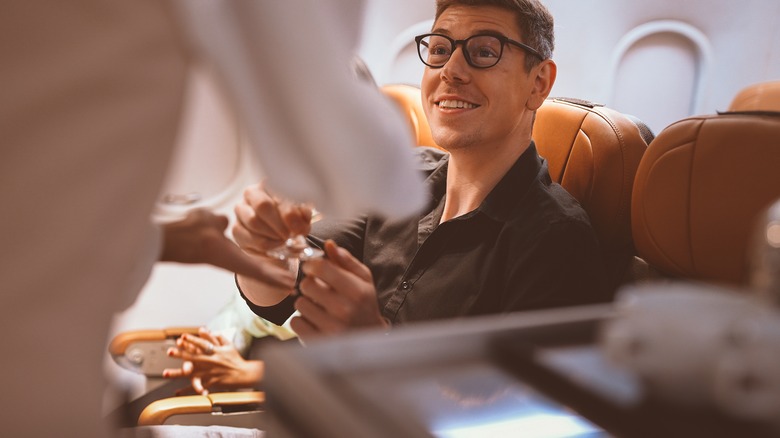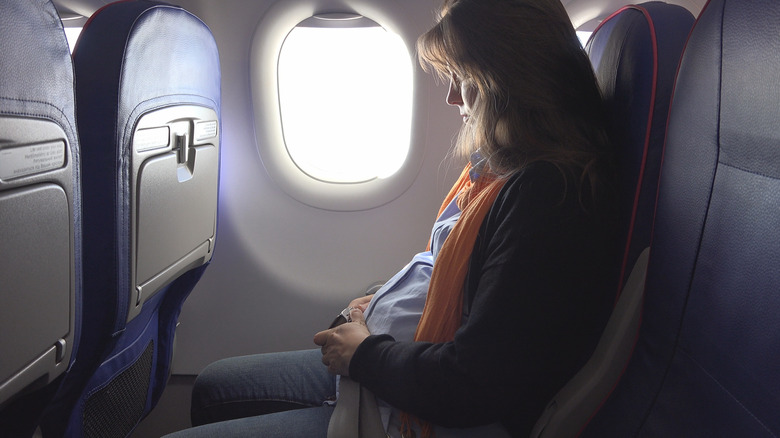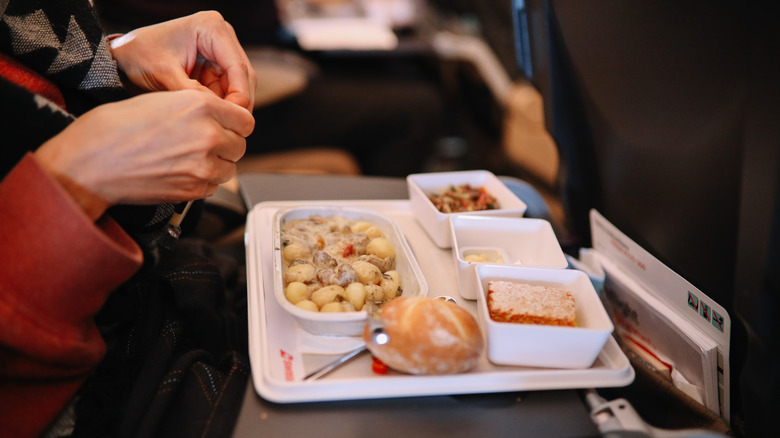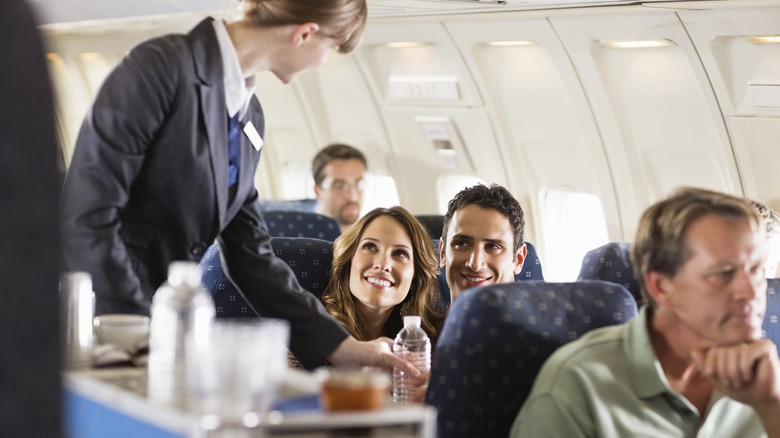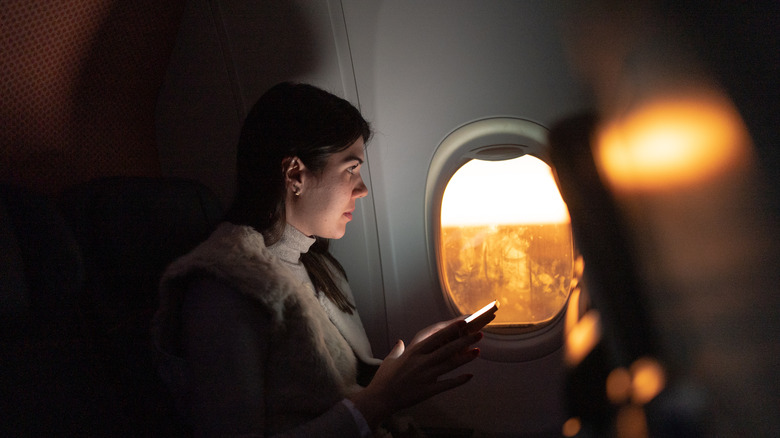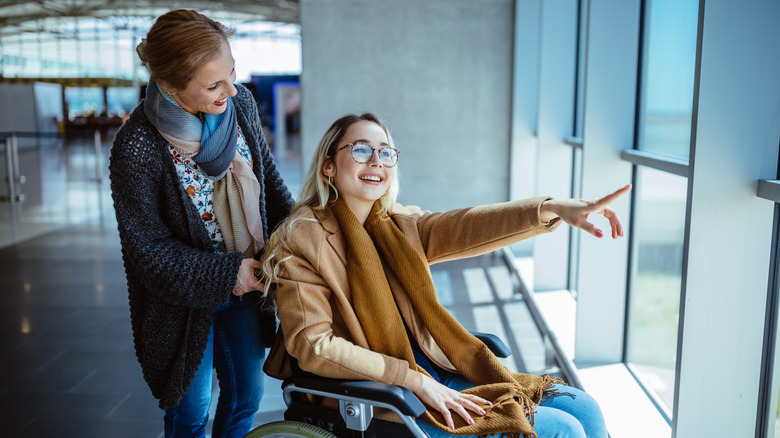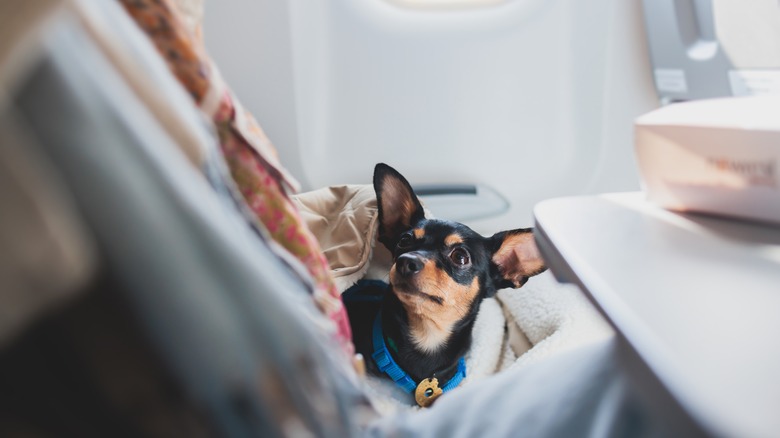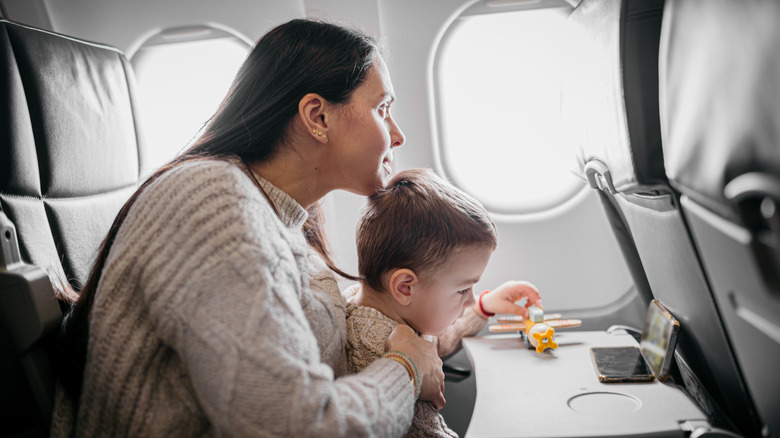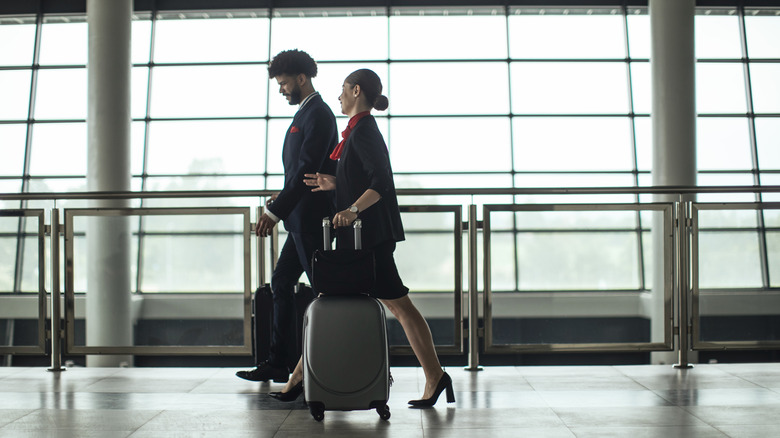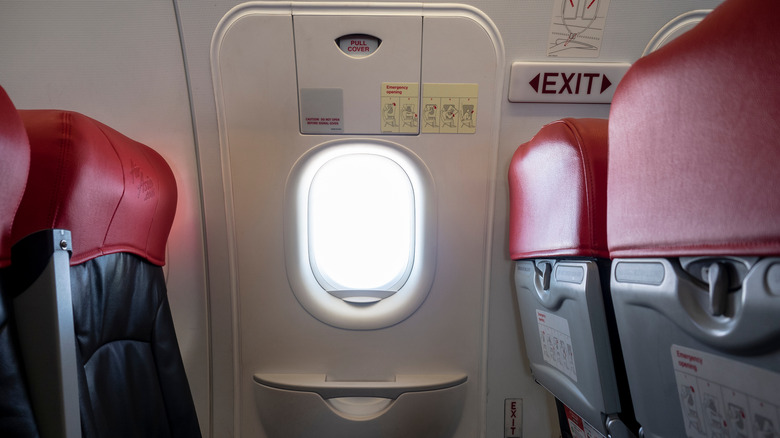Things Flight Attendants Notice About You When You Board A Plane
Whether you're a frequent flier or someone who takes to the skies once in a blue moon, you've probably learned a few things about flying that can make the experience smoother: how best to prepare yourself for the security process, what to pack (and what not to pack) in your carry-on luggage, and whether you prefer the aisle or window. But have you ever taken the time to notice your cabin crew, or given thought to what goes on behind the warm greetings you receive as you step on board?
Whether you do or not, you can be sure that flight attendants notice a lot about you. As it turns out, they're trained to pick up on everything about passengers in the blink of an eye — in around three to four seconds. From noting anxious fliers and those likely to be swerving the rules, to passengers who might need a little extra help and assistance, it's safe to say you're being judged in one way or another as you prepare to take your seat. Rest assured, flight attendants do this mainly in the interest of your safety and comfort, but they're just as interested in things like what you're wearing, too. If you're curious to find out what the flight crew is noticing about you, here's a rundown of what exactly they're looking for.
Your clothing, shoes, and jewelry
Besides someone's face, outfit choices are one of the first things we notice about a person. How many times have you clocked someone looking you up and down in public, taking in what you're wearing in all but a split second? Well, it's no different when it comes to members of the cabin crew as you board your flight, although their reasons for doing so are slightly different. You see, flight attendants are looking for any item of clothing or jewelry that might become a hazard, especially in an emergency — think something that's loose or hanging awkwardly — as well as passengers wearing items that are just plain uncomfortable. High heel shoes, big hoop earrings, and jumpsuits or tight-fitting clothing are just some of the things you should think twice about wearing on your flight.
Instead, prioritize comfort over style, especially if it's going to be a long journey. That means having a jumper on hand for when it gets chilly in the cabin, donning a pair of stretchy pants that are easy to adjust or remove when going to the bathrooms, as well as a pair of your comfiest sneakers. When you dress for comfort and function, you can't go wrong.
Your baggage
It might sound ridiculously obvious, but cabin crew are primed to hone in on your luggage. They check things like if your luggage has been tagged for cargo, if you're wearing a fanny pack, the size of your personal bag, and if you look like you're struggling to carry your luggage. They're also scanning to see if your luggage is oversized and likely to cause problems in the aisles or overhead bins. After all, this sort of thing slows down the boarding process, which is bad news for everyone.
Or, maybe you're someone who's trying to skirt airline rules by bringing too many bags on board. While it might be your lucky day sliding past check-in desks and boarding gate staff, it's virtually impossible to hoodwink flight attendants in this department. Besides, it's just not worth the hassle. Instead, do yourself a favor and triple-check all the requirements for each specific airline well before you fly, such as personal bag allowances and size dimensions, and always weigh your bags before getting to the airport.
Your health
Physical appearance is something you're likely to notice about any new person you come across. Consciously or not, we can usually tell if someone looks well-rested and healthy, or sniffly, sleep-deprived, and anxious. This health assessment is magnified for flight attendants, who're searching for signs of illness during the boarding process. Think about it. They're about to share a confined space with hundreds of people, where those nasty germs can spread very easily. Also, if the cabin crew knows you're feeling under the weather, they can make arrangements to make you more comfortable — maybe you need to be closer to the toilets or swap for an aisle seat, for example.
If the illness or symptoms seem serious enough, however, flight attendants will need to make a call about whether or not you're fit to fly. If not, you might have to leave the plane before takeoff. On the other hand, if you're in tip-top shape, it's a massive green flag for airline staff. You're much more likely to be an asset if there were to be an emergency, for instance. Plus, if you look strong, maybe you can aid staff in other ways by helping fellow passengers lift their bags into the overhead compartments. Flight attendants actually check for able-bodied passengers (also known as ABPs) during boarding and note their seating placements. These ABPs could be potentially helpful in an emergency.
How far along you are
If you're expecting, the cabin crew is well-trained to judge how many weeks pregnant you are. The main reason for this is tied to safety. It's generally fine to hop on a plane before the 36-week mark unless you or the baby have experienced complications. Afterward, some airlines might ask for a doctor's note proving you're safe to travel. In any scenario, booking a flight within four weeks of your due date is not a good idea, in case you deliver early. No one wants to go into labor on a plane, do they?
Aside from this, flight attendants will also want to know how far along you are to make traveling while pregnant even easier for you — whether that's giving you a seat with more legroom to stretch out, an aisle seat to move around the cabin more freely, or seating close enough to the bathrooms. Flight attendants may also check in with you more frequently concerning food, beverages, and your general comfort.
If you've brought your own food
We all know that plane food isn't the healthiest or tastiest grub, although you probably haven't thought much past this. But as flight attendant Shreyas Parikh posted on the online question and answer board Quora: "The food on your tray is prepared not in the galley but in the aircraft catering, which is often done 12 hours before and even days before the aircraft departure."
What's more, our taste buds and sense of smell go a little off whack when we're thousands of feet in the air (due to increasing pressure in the cabin), which makes everything taste a bit more bland. With this in mind, Shreyas goes on to say that "airline catering in recent years has really pumped up the spices, salts, and fats — all to make your mouth happy."
Cabin crews may steer clear of plane food themselves, bringing homemade meals, or shop-bought items, on board with them instead. It's why passengers who take the initiative to bring their own food may be quietly admired for their careful planning, awareness, and health consciousness.
If you're friendly
Are you someone who huffs and puffs while waiting to board or someone who waits patiently for your turn? This one might come as a bit of a shock, but you can be sure that flight attendants are carefully scanning the boarding gates before you've even gotten to the plane, taking in your demeanor and making their judgments about how easy of a passenger you're going to be. Among flight attendants, there's even a term for passengers who crowd the gate before their boarding group: "gate lice."
Don't take this the wrong way, and this isn't meant to come across as rude. The cabin crew merely wants to know who they'll be in the air with for the next few hours. Wouldn't you? Whether you're simply keen to be friendly, prefer a smoother flight, or want to make a good impression for possible freebies and upgrades, do your best to make eye contact with crew members, listen when they're giving instructions (especially when it comes to pre-departure announcements), and be as respectful as possible to other passengers around you.
If you're a nervous flier
Flight attendants are also pros at spotting anxious passengers. If you fall into this camp, there's nothing to worry about. In fact, it's a good idea to introduce yourself and let the cabin crew know about any worries you may have, although they've probably already noticed your jitters. Tell-tale signs they look for range from mild to severe — such as fiddling with personal items, symptoms of someone experiencing nausea, or even more serious symptoms that indicate the onset of a panic attack.
Remember that flight attendants are in the best position to make your trip as comfortable as possible, and who knows, they may even be able to adjust your seating position to calm you down. For instance, you could be given a seat in the center of the plane, over the wings, or more toward the front. These areas tend to avoid significant turbulence during the flight. Or, if you're traveling alone and have a fear of take-off or landing, they may even be able to help you through it by keeping eye contact with you.
If you're intoxicated
As a reminder, you shouldn't knock back too many alcoholic drinks before your flight. Staff can pick up on all the signs of intoxication in an instant, whether that's slurred speech, unusual and disruptive behavior, or aggressiveness. In fact, it's one of the reasons why flight attendants greet you as you board the plane — they're flagging passengers who may show signs of disruptive or antisocial behavior. The same goes for drug intoxication. In either case, you can be removed from the flight before it's even taken off.
Nuralia Mazlan, a flight attendant for Air Asia, wrote on Quora that she's always looking out for "the intoxicated/high as a kite passenger." She goes on to say that "these are the type of people that are more likely to create troubles on board 90% of the time," citing a 20-year-old man who stripped naked on one of her flights from Kuala Lumpur to Dhaka.
If you have a disability or require assistance
This one is a biggy. You've likely made airline staff aware of any required assistance before you've arrived at the airport during the booking process. However, for some people whose disability flies a little under the radar, the cabin crew always has their eyes peeled during boarding to determine who may benefit from a little more help during the journey. This also includes families with small children or babies, as well as elderly travelers. In the event of an emergency, flight attendants need to know who may require special assistance.
Once flight attendants notice, they can help make sure your flight runs as smoothly as possible. Maybe you need a little more legroom, a seat in the center of the plane to avoid turbulence, a row to yourself (if there's space) because you're feeling ill, or prefer seating closer to the bathrooms. It's a flight attendant's job to look after you, so don't hesitate to ask for reasonable accommodations.
If you're trying to smuggle contraband
Trying to hoodwink airline staff by bringing your own alcohol on board in a not-so-conspicuous container, hoping they won't notice you taking a swig every now and then, isn't a good idea. Again, flight attendants are the eyes in the sky. Besides, on many flights, you'll be given the option of a few different alcoholic beverages for free, so why even risk it? Sure, you're unlikely to get a world-class choice of French wines, but it's better than nothing.
And don't even think about taking a cigarette, including an e-cigarette, break. There's just no way you'll get away with sneaking off to the toilet for one. For starters, each bathroom is fitted with a smoke detector alarm, which will "out you" to the cabin crew right away. It's also very illegal, and a few puffs can lead to hefty fines or imprisonment.
It's also a complete no-no to smuggle your furry friends on board, but you'd be surprised how many people try squeezing them into handbags and purses. In fact, you can only travel internationally with your pets if they've been professionally vetted, fit comfortably in an FAA-approved pet carrier, and are registered with the airline well before your flight ... and you've paid all the necessary fees.
Who you're boarding with
A fairly obvious, but important, thing flight attendants will notice upon boarding is your group. Flight attendants will carefully note who you're getting on the plane with, whether that's small children, your partner, business colleagues, an elderly relative, or if you're traveling solo. The primary reason for this is to make sure they're in the best place to assist you if you need a helping hand. This could mean assisting parents of screaming toddlers or offering a bit of encouragement to a nervous solo flyer.
It's also helpful for flight attendants to know who's with whom when it comes to seating arrangements for both assistance in case of an emergency and general passenger satisfaction. After all, the number one objective for cabin crew is to make sure all passengers are happy and safe. When possible, flight attendants may try to arrange seating to help ensure families and friends sit together.
If you're a flight attendant or a pilot
One of the last things a member of the cabin crew will aim to pick up on is whether or not you're an airline employee. Apart from having a lot in common with you, flight attendants are looking to see if you're someone who could potentially help in an emergency. Crew members who hop on a plane for leisure are especially useful in this instance. They've been trained in all necessary safety procedures.
Although rare, there's always the risk of something going wrong when you take to the skies. The 1989 United Flight 232 is a good example, which crash-landed in Sioux City, Iowa. Although 112 people sadly lost their lives, it would have been much more had Dennis Fitch, a United Airlines captain who was on board as a passenger, not taken over the controls of the throttles and assisted the plane's captain at the time. It's an extreme example, but it just goes to show how helpful an extra pair of trained hands can be in an emergency.
If you're sitting in an emergency row
It comes with the promise of extra legroom, but having those magic emergency row numbers on your ticket also comes with a whole load of extra responsibility. Along with making sure you're on the right flight, flight attendants insist on scanning everyone's boarding pass when you get on the plane to note who's sitting in emergency rows. They're looking to see if you're comfortable (and capable) enough to fulfill the role.
To sit in the emergency exit row, passengers must be physically able to operate the emergency exits; able to read and understand emergency procedures; and be capable of conveying instructions to other passengers. With this in mind, it's the cool, calm, and collected passengers who will be asked to sit in an empty emergency exit row. If you're a nervous flyer and find yourself in the row, you should notify the cabin crew of your jitters and swap seats with someone else. But, trust us, they've probably already noticed.
